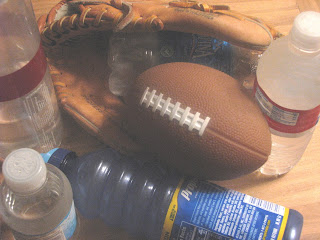
332 Days to go! The countdown has finally begun for the opening day of the 2008 Summer Olympics in Beijing, China. 16 days of passion filled competition …where every participant fights to make a name for themselves and their country. If waiting over three hundred days is too much anticipation for one person to handle, you can always get a head start by checking out http://beijing2008.com/ right now.
None of the much anticipated Games could take place if the development of The Olympic Movement had never occurred. The Olympic Movement is best known for its organization of the winter and summer Olympic Games. But the international organization strives to expand traditional Olympic values throughout the world.
Since the early 1990’s, The Olympic Movement has become more involved in taking care of mother Earth and trying to develop more “green games”. The fact that athletes and sports are the most pertinent concepts to the Olympic Games is never forgotten, but members of the Movement realize that greater acknowledgement of the environment is definitely runner up.
With the constant threat of global warming, there is more focus on different strategies that can take place during the Games that will minimize negative impacts that might occur through sport. Several institutions including; the Olympic Solidarity, Organizing Committees of the Olympic Games and National Olympic Committees organize events and activities to bring attention to issues affecting the environment. Activities and discussions usually take place on the UN World Environment Day that is held every year on June 5.
I could not get in contact with any representatives from the Olympic Movement, or the Sport and Environment Commission to ask about the negative impacts that they are trying to avoid, but I came up with a few ideas to suggest.
In my opinion, the two major concerns resulting from massive sporting events are: 1. Waste production and 2. Pollution production. I could minimize consumer and athletic waste by half with one perfect solution. Free water refills. When a die hard Olympic fan buys a bottle of water, they can have as many free refills as they would like, as long as they bring back their original water bottle. And the same goes for the athletes competing. There would be a slight decline in the overall profit, but it would hardly be noticed when compared to the cost of tickets, merchandise, and food.
My second idea is free parking for fans that carpool. It will reduce the amount of pollution, and make traveling easier for everyone since there would be noticeably less traffic. Public transportation might already be a must in a city like Beijing, but once the Olympics return to Los Angeles, carpooling is something that must be enforced.
My simplistic ideas are those of just one person, but it seems I’m behind the rest of the institutions that have been planning a healthier unity between sport and environmental friendliness for many years now. These Earth respecting institutions are committed to making a difference by providing new knowledge on environmental issues, “by sharing experiences and expertise from different sectors of society, encourage cooperation in, and further development of, environmental policies in relation to sport.” http://www.olympic.org/
None of the much anticipated Games could take place if the development of The Olympic Movement had never occurred. The Olympic Movement is best known for its organization of the winter and summer Olympic Games. But the international organization strives to expand traditional Olympic values throughout the world.
Since the early 1990’s, The Olympic Movement has become more involved in taking care of mother Earth and trying to develop more “green games”. The fact that athletes and sports are the most pertinent concepts to the Olympic Games is never forgotten, but members of the Movement realize that greater acknowledgement of the environment is definitely runner up.
With the constant threat of global warming, there is more focus on different strategies that can take place during the Games that will minimize negative impacts that might occur through sport. Several institutions including; the Olympic Solidarity, Organizing Committees of the Olympic Games and National Olympic Committees organize events and activities to bring attention to issues affecting the environment. Activities and discussions usually take place on the UN World Environment Day that is held every year on June 5.
I could not get in contact with any representatives from the Olympic Movement, or the Sport and Environment Commission to ask about the negative impacts that they are trying to avoid, but I came up with a few ideas to suggest.
In my opinion, the two major concerns resulting from massive sporting events are: 1. Waste production and 2. Pollution production. I could minimize consumer and athletic waste by half with one perfect solution. Free water refills. When a die hard Olympic fan buys a bottle of water, they can have as many free refills as they would like, as long as they bring back their original water bottle. And the same goes for the athletes competing. There would be a slight decline in the overall profit, but it would hardly be noticed when compared to the cost of tickets, merchandise, and food.
My second idea is free parking for fans that carpool. It will reduce the amount of pollution, and make traveling easier for everyone since there would be noticeably less traffic. Public transportation might already be a must in a city like Beijing, but once the Olympics return to Los Angeles, carpooling is something that must be enforced.
My simplistic ideas are those of just one person, but it seems I’m behind the rest of the institutions that have been planning a healthier unity between sport and environmental friendliness for many years now. These Earth respecting institutions are committed to making a difference by providing new knowledge on environmental issues, “by sharing experiences and expertise from different sectors of society, encourage cooperation in, and further development of, environmental policies in relation to sport.” http://www.olympic.org/

For addition information on the relationship between living green and sports, check out the Manual on Sport and Environment written by the International Olympic Committee.
Manual on Sport and the Environment

No comments:
Post a Comment